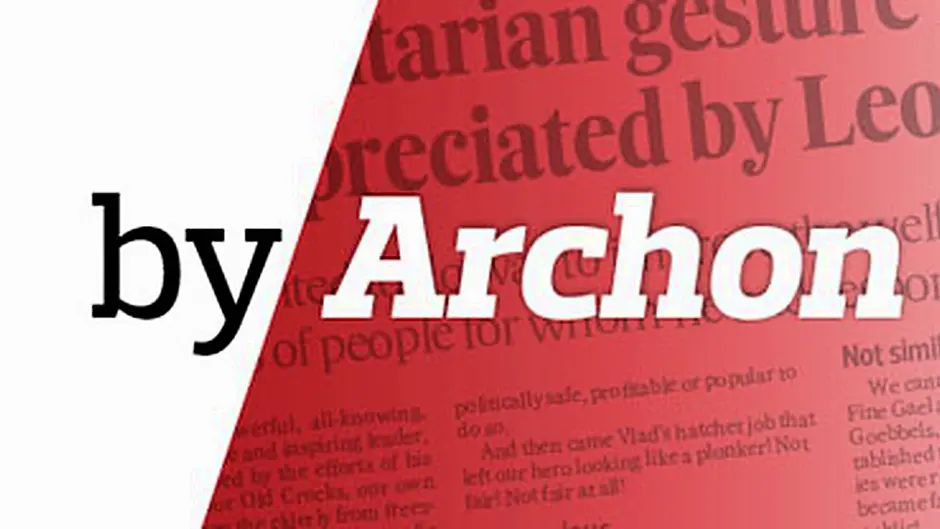Micheál Martin's critics contemptuously refer to the deal as the Capitulation and Servitude Agreement
THE term Electile Dysfunction might describe, at a stretch, the situation in which Fianna Fáil currently finds itself as the party does its utmost to ensure that its political rivals, Fine Gael, continues in government!
Unlike what happens in other countries where the Opposition tries to oust its rivals, Micheál Martin cobbled together an extraordinary agreement – the Confidence and Supply deal – to keep Fine Gael in power! His critics contemptuously refer to the deal as the Capitulation and Servitude Agreement.
Under the plan, the Soldiers of Destiny promise not to trigger a general election and bring down the Blueshirt government. Nobody knows what Fianna Fáil gets in return for its slavishness, but Varadkar said last week that he gave no promises to Fianna Fáil as part of the agreed ‘Confidence and Supply’ extension.
In other words, the only favours handed to Fianna Fáil were a benign tap on the head for being such good sports, accompanied by barely concealed burst of laughter at the fact that Mickey now was the ‘best ever FG deputy leader’!
In the process, De Valera’s once proud party has become a non-entity. Interesting too that Mickey is not unlike the Long Fella who looked into his soul whenever he had to make a difficult decision.
The Corkman did something similar. He did not consult his party when he signed up for another stint as official mudguard for Fine Gael. It seems the course of action that FF has embarked on manifested itself miraculously in Mr Martin’s brainpan, and he acted accordingly.
Lack of differences
He didn’t even seek a straw vote among the party, which (possibly) was a wise move as such a procedure only would have shown where the hot air was blowing, and nothing else.
So, rather like the prophets in the Old Testament, this great soul, this intellectual wizard and learned judge, this Daniel come to judgement, decided that democracy in Fianna Fáil was nothing more than the counting of heads, regardless of the contents.
We now know that by extending the Confidence and Supply agreement Mickey has copper-fastened in the nation’s political consciousness the lack of discernible ideological differences between Fianna Fáil and Fine Gael. Each side, of course, possesses different networks and factions but, when all is said and done, Fianna Fáil and Fine Gael are mirror images of each other: a modern version of Tweedle Dee and Tweedle Dum.
Even more astonishing is the fact that Martin’s policy of propping up Fine Gael has not led to any surge in support for his own party. Indeed, it is ironic that his policy has turned Fine Gael into the most popular political outfit in the country – a weird development made evident in recent polls.
Mickey explained last week that it was his duty as a responsible politician to support Fine Gael now that the Blueshirts were up to their oxters trying to keep tabs on the Brexit negotiations. He said: ‘Since Brexit happened, politics has been overshadowed by the (Brexit) implications and it’s out of that reality the decision we have taken has been based … the national interest must be put ahead of party politics.’
Load of cobblers
Sounding somewhat like Winston Churchill, he presented his stance as an example of political wisdom and moral righteousness; and he made his point with such conviction that some of his old pals in the meeja fell over themselves in adulation
But others interpreted his use of Brexit and the danger of rocking the boat at such a sensitive time as nothing more than a load of cobblers. Nor was there much enthusiasm for his policy of helping Fine Gael survive as a protected species.
The brutal fact of the matter is that Fianna Fáil under Mickey’s stewardship has been unable to gain ground on Fine Gael, and has been running a poor second to them.
Here’s the evidence: This time last year (December 2017), according to an Irish Times-Ipsos MRBI poll, Fine Gael was on 36% support and Fianna Fáil on 25%.
In January 2018, Fine Gael suffered a drop to 32% while support Fianna Fáil was at 26%. On February 24th 2018, a Red C-Sunday Business Post poll showed no change for Fine Gael at 32% while Fianna Fáil jumped three points to 29%
In March 2018, a Sunday Times-Behaviour and Attitudes poll put Fine Gael at 32%, Fianna Fáil at 27%.
Fianna Fáil decline
In April 2018, Fine Gael remained the most popular party in the country. The Red C-Sunday Business Post poll had Fine Gael at 32%, Fianna Fáil at 25% and Sinn Féin at 14%.
On May 20th 2018, the Red C-Sunday Business Post poll had Fine Gael at 34%, Fianna Fáil at 25% and Sinn Féin at 16% support.
In June 2018, a Behaviour and Attitudes poll published in The Sunday Times showed that Fine Gael remained the most popular party among voters with a support level of 31%.
By September, Fine Gael had lost ground, but still managed to increase its lead over Fianna Fáil. A Red C poll for the Sunday Business Post had the government party dropping one point to 33% but still eleven points ahead of Fianna Fáil, which dropped three points to 22%.
Not good reading for Mickey who was heading Fianna Fáil into the next Dáil term, while his party was at its lowest support level in almost a year
In October 2018, things got worse: An Irish Times-Ipsos MRBI opinion poll found that support for Sinn Féin almost matched support for Fianna Fáil, and that 44% of voters wanted a general election.
Fine Gael was on 33%, Fianna Fáil at 25% while Sinn Féin was breathing down Mickey’s neck with 24%.
Bad politics
In other words, the polls showed that Fianna Fáil was not making progress, prompting fears that his palsy-walsy arrangement with Fine Gael had done serious harm to the Soldiers of Destiny.
And now, Deputy John McGuinness said that the 2020 Confidence and Supply extension put the party in a straitjacket: ‘It is not the right kind of politics … people will feel abandoned by the party if implemented,’ he said. ‘People are quite well aware that there is disquiet within the parliamentary party and there is certainly disquiet within the broader membership of the party because they see us as being in opposition, but yet being in government at the same time.’
All of which prompts this question: how soon will it be before the cry goes up that Mickey must go?









